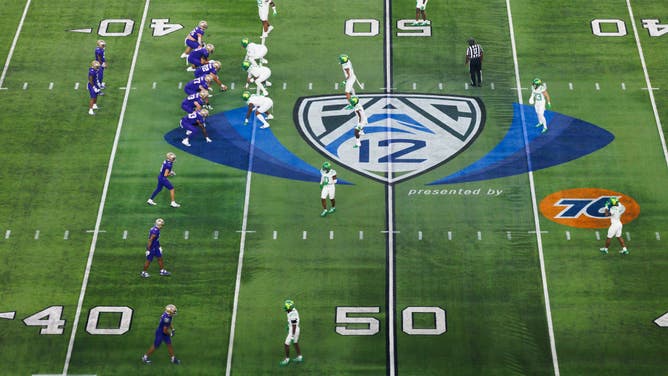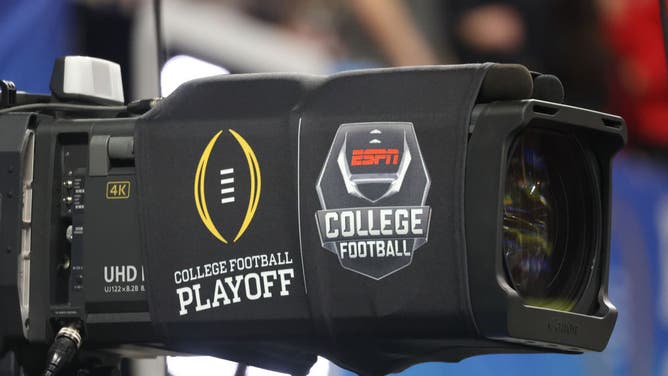We support our Publishers and Content Creators. You can view this story on their website by CLICKING HERE.
When the Pac-12 lost all but two member institutions in the last round of realignment, which sent shock waves around the college athletics world and created a massive ripple-effect, Washington State and Oregon State were looking for a life-raft to help them through the next two years of scheduling. It was the Mountain West Conference that jumped at the opportunity.
The whole point of the scheduling agreement that was signed by both parties was to benefit each other, with the hopes of a potential merger down the road. But, when Washington State and Oregon State won a lawsuit that would give them the rights to the Pac-12 name, along with the ability to reform the conference, it was clear that those two schools were hoping to revitalize the ‘Conference of Champions’.
There was just one big problem with the agreement that both parties signed, and it revolved around a ‘poaching’ clause that the MWC had put in the scheduling agreement. Once both sides could not agree to a deal that would tie both conferences together for the 2025 season, this was the perfect opportunity for the Pac-12 to start rebuilding, which meant adding teams from the Mountain West.
While Matthew Sluka might be leaving UNLV, the school did share some good news on Wednesday night about its future.
UNLV and Air Force declared that they would both stay in the Mountain West Conference, receiving additional monetary incentives that were enticing enough to stay, and not leave for the Pac-12.
Now, with the money that the Mountain West Conference will receive from buyouts that schools leaving are having to pay, this means that there would be extra incentives to keep them from jumping to the Pac-12. According to one report, both Air Force and UNLV are expected to receive a signing-bonus that would pay each school between $25-$30 million for staying put.
While the Pac-12 had agreed to pay the MWC a $14 million fee to be included in the scheduling for the 2024 season, they had also signed their name to a clause that would force them to pay the Mountain West a substantial amount of money if they started adding teams from the conference they were in agreement with.

The Pac-12 is fighting the Mountain West conference in a court room over ‘poaching fees’ that are costing millions (Photo by Ric Tapia/Getty Images)
Also, don’t forget about the FBS threshold for being recognized as a conference. Currently, the MWC has six full-fledged members, as Hawaii is only a partial member. So, they need two more teams to join the conference to reach the FBS status.
As for the Pac-12, they are still looking for one more school to join, with the ‘grace-period’ given to the Pac-12 expiring in 2026.
So, along with trying to entice schools to join each conference, they both need to lure three more schools combined.
But in terms of the MWC, they are exercising the ‘poaching’ clause in the agreement signed by both parties for scheduling purposes in 2024, which will help pay for the extra incentives that are being given to UNLV and Air Force.
This is why the Pac-12 filed a lawsuit on Tuesday morning in Northern California, claiming that the ‘poaching’ fees are illegal.
“The Poaching Penalty saddles the Pac-12 with exorbitant and punitive monetary fees for engaging in competition by accepting MWC member schools into the Pac-12,” the Pac-12 conference wrote. “The MWC imposed this Poaching Penalty at a time when the Pac-12 was desperate to schedule football games for its two remaining members and had little leverage to reject this naked restraint on competition. But that does not make the Poaching Penalty any less illegal, and the Pac-12 is asking the Court to declare this provision invalid and unenforceable.”
How Much Money Is The MWC Demanding From Pac-12 For ‘Poaching’?
So, how much are these fees that the Pac-12 felt are illegal? Well, the current number is hovering around $43 million, but that’s before Utah State joins the Pac-12. Now, the MWC is demanding that they be paid $50 million in ‘poaching’ fees that the first scheduling agreement detailed.
Once the Pac-12 added Boise State, Fresno State, San Diego State, and Colorado State in the past week, the MWC conference initiated the clause in the agreement. Each school represented $10 million for poaching, so you can see where the Mountain West feels as if they are owed the money.
Also, don’t forget about the ‘exit fees’ that each school leaving the Mountain West owes the conference by jumping to the Pac-12. That monetary figure is separate from this ‘poaching’ fee, and it will cost each school upwards of $17 million to leave the MWC, just as you see with any team looking to leave a conference before their contract obligations are up.

The Pac-12 is fighting the Mountain West conference in a court room over ‘poaching fees’ that are costing millions. (Photo by Michael Wade/Icon Sportswire via Getty Images)
So, the messy breakup between these two conferences, who are both looking to stay afloat in this new era of college athletics, has certainly triggered a major problem for the Mountain West, which is being gutted.
In terms of the lawsuit filed by the Pac-12 on Tuesday morning, MWC commissioner Gloria Nevarez said that her conference was not taking advantage of the Pac-12 when they were at their lowest.
“It is my responsibility to protect the Conference and always keep its best interests in mind,” the MWC statement read. “The Pac-12 Conference is challenging a contractual provision that it expressly agreed to and acknowledged was essential to the Mountain West Conference’s willingness to enter into a Scheduling Agreement, all while advised by sophisticated legal counsel. The provision was put in place to protect the Mountain West Conference from this exact scenario. It was obvious to us and everyone across the country that the remaining members of the Pac-12 were going to try to rebuild.”
“The fees at issue were included to ensure the future viability of the Mountain West and allow our member institutions to continue providing critical resources and opportunities for our student-athletes. At no point in the contracting process did the Pac-12 contend that the agreement that it freely entered into violated any laws. To say that the Mountain West was taking advantage of the Pac-12 could not be farther from the truth.
Where Is This Headed? Both Conferences Looking For Media Deals
The problem with this whole situation is that everyone could see this coming. We knew that once Oregon State and Washington State received the rights to the Pac-12 name and finances, that they were going to look for ways to expand.
The other problem is that the Mountain West Conference has a media rights deal that expires in 2026, while the Pac-12 is shopping for potential networks to call home.
While the Mountain West might have agreed to a scheduling deal that would give both the Beavers and Cougars enough opponents to play a full schedule this season, it always felt as if the Pac-12 was going to push forward with re-branding.
Once Utah State agreed to join the Pac-12, it forced UNLV to take another look at leaving the Mountain West conference, but that took a turn on Wednesday night, as previously discussed.
Both conferences are trying to find television homes for the future, in the arms race that has taken a number of turns in the past few months. So it’s easy to see why both the Pac-12 and Mountain West are involved in a nasty breakup, which has now spilled over into a court-room.
One thing is certain, this is far from over, as both look to stay relevant in the eyes of college athletics.

 Conservative
Conservative  Search
Search Trending
Trending Current News
Current News 





